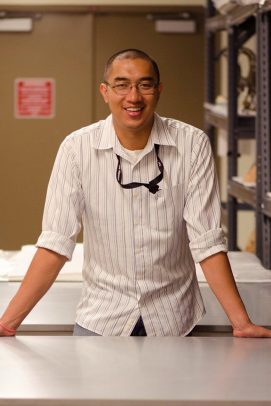Inspiring grads: Developing archaeology as a discipline in the Philippines
It was nearly two decades ago that Michael Armand Canilao felt a calling to study anthropology, a pull so strong that he would eventually travel more than 8,000 miles away from his home and family to see it through at UIC.
And it all started with a machine gun and some dynamite.
Canilao was an undergraduate at the University of Philippines Baguio exploring different subjects when he and his family moved to Sablan, a suburb of Baguio City, on the Philippines’ Luzon island.
“Our house is actually a historic site that was one of the trenches during World War II, so there was a machine gun,” he said. “When we moved in to construct our house, we encountered a lot of archeological materials in that hill.”
The experience inspired him to join the archeology school at the university, where he would go on excursions to other islands and participate in excavations. They looked at materials, habitation sites and burial sites dating back to before and after Spanish conquistadors discovered there was gold and colonized the Philippines.
Then came the dynamite.
“Our professor set up a field trip and brought us inside one of the ancient gold mines, which was being mined industrially at the time,” Canilao said. “We entered the gold mine and they turned off all the lights and exploded dynamite to help us feel how a miner would feel under such circumstances.”
That set off his interest in gold. More specifically, the archeological history of gold mining by tribal people, their upland-lowland interactions and gold exchanges. He dedicated four degrees to studying these topics: master’s degrees in archaeology (University of Philippines Diliman ’08), anthropology (UIC ’15); and environmental and urban geography (UIC ’17), as well as a Ph.D. in anthropology (UIC ’18).
His research led him to publish two books in the Philippines, five articles in the Journal of Archaeological Science, a chapter on gold mining in a Yale University Press book, nearly 20 peer-reviewed articles in journals, awards such as the Satellite Imagery Grant from the DigitalGlobe Foundation, and other professional development opportunities like participating in a World War II remains recovery project led in part by the Defense POW/MIA Accounting Agency.
In short, Canilao is an accomplished researcher and a competitive job applicant.
He’s negotiating a tenure-track, full-time faculty position in the Philippines at Ateneo de Manila University in Manila, the country’s capital. He’ll earn just one-tenth of what he could earn in the United States.
But it’s all for a greater cause.
“In the Philippines, archaeology has taken the back seat,” Canilao said.
He will be leading an initiative at the university to develop archaeology as a discipline.
“By going back, I can help make sure that archaeology becomes relevant to the society,” he said. “Students will see the value of looking into the past and appreciating the past.”
Canilao is excited about being close to his family and colleagues. He’s also looking forward to teaching and expanding his research.
“I appreciate all my professors gave me,” he said.

